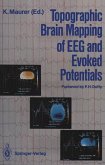Human Evoked Potentials
Applications and Problems
Herausgegeben:Lehmann, Dietrich
Human Evoked Potentials
Applications and Problems
Herausgegeben:Lehmann, Dietrich
- Broschiertes Buch
- Merkliste
- Auf die Merkliste
- Bewerten Bewerten
- Teilen
- Produkt teilen
- Produkterinnerung
- Produkterinnerung
From August 25 - 28, 1978 a conference on averaged evoked po tentials was held at Konstanz, West Germany. Research on human evoked potentials has progressed rapidly in the past decade, and a series of international conferences have served to maintain com munication between active workers in the field. Among the organiza tions that have a tradition of supporting such mUlti-national com munication are the North Atlantic Treaty Organization Scientific Affairs Division, the u.s. Office of Naval Research and the German Research Society (Deutsche Forschungsgemeinschaft). We have been fortunate to…mehr
Andere Kunden interessierten sich auch für
![Evoked Brain Potentials in Psychiatry Evoked Brain Potentials in Psychiatry]() Charles ShagassEvoked Brain Potentials in Psychiatry39,99 €
Charles ShagassEvoked Brain Potentials in Psychiatry39,99 €![Advanced Evoked Potentials Advanced Evoked Potentials]() Advanced Evoked Potentials77,99 €
Advanced Evoked Potentials77,99 €![Evoked Brain Potentials and Behavior Evoked Brain Potentials and Behavior]() Evoked Brain Potentials and Behavior77,99 €
Evoked Brain Potentials and Behavior77,99 €![Visual Evoked Potentials Visual Evoked Potentials]() Wanda Parham-BruceVisual Evoked Potentials32,99 €
Wanda Parham-BruceVisual Evoked Potentials32,99 €![Topographic Brain Mapping of EEG and Evoked Potentials Topographic Brain Mapping of EEG and Evoked Potentials]() Topographic Brain Mapping of EEG and Evoked Potentials78,99 €
Topographic Brain Mapping of EEG and Evoked Potentials78,99 €![Event-Related Potentials and Evoked Potentials Event-Related Potentials and Evoked Potentials]() Event-Related Potentials and Evoked Potentials71,99 €
Event-Related Potentials and Evoked Potentials71,99 €![Electromyography and Evoked Potentials Electromyography and Evoked Potentials]() Electromyography and Evoked Potentials77,99 €
Electromyography and Evoked Potentials77,99 €-
-
-
From August 25 - 28, 1978 a conference on averaged evoked po tentials was held at Konstanz, West Germany. Research on human evoked potentials has progressed rapidly in the past decade, and a series of international conferences have served to maintain com munication between active workers in the field. Among the organiza tions that have a tradition of supporting such mUlti-national com munication are the North Atlantic Treaty Organization Scientific Affairs Division, the u.s. Office of Naval Research and the German Research Society (Deutsche Forschungsgemeinschaft). We have been fortunate to have the support of all three. In the early stages of planning, a committee was formed composed of Professors Rudolph Cohen (Konstanz), Otto Creutzfeldt (Goettingen), John Desmedt (Brussels), A.M. Halliday (London), Anthony Remond (Paris) and Herbert Vaughan (New York). A call for papers was circulated as widely as possible, and this committee carried out the difficult task of selecting a limited number of participants from a large number of excellent abstracts. At the same time Professor Cohen of the University of Konstanz was generous enough to shoulder the task of playing host to the conference. His thoughtful arrangements contributed enormously to the comfort of the participants. He and his colleagues also engi neered an ideal ambience for sharing of ideas and observations, while the University of Konstanz generously provided audio-visual support.
Hinweis: Dieser Artikel kann nur an eine deutsche Lieferadresse ausgeliefert werden.
Hinweis: Dieser Artikel kann nur an eine deutsche Lieferadresse ausgeliefert werden.
Produktdetails
- Produktdetails
- Nato Conference Series 9
- Verlag: Springer / Springer US / Springer, Berlin
- Artikelnr. des Verlages: 978-1-4684-3485-9
- Softcover reprint of the original 1st ed. 1979
- Seitenzahl: 512
- Erscheinungstermin: 17. März 2012
- Englisch
- Abmessung: 244mm x 170mm x 28mm
- Gewicht: 874g
- ISBN-13: 9781468434859
- ISBN-10: 1468434853
- Artikelnr.: 39494331
- Herstellerkennzeichnung
- Springer-Verlag GmbH
- Tiergartenstr. 17
- 69121 Heidelberg
- ProductSafety@springernature.com
- Nato Conference Series 9
- Verlag: Springer / Springer US / Springer, Berlin
- Artikelnr. des Verlages: 978-1-4684-3485-9
- Softcover reprint of the original 1st ed. 1979
- Seitenzahl: 512
- Erscheinungstermin: 17. März 2012
- Englisch
- Abmessung: 244mm x 170mm x 28mm
- Gewicht: 874g
- ISBN-13: 9781468434859
- ISBN-10: 1468434853
- Artikelnr.: 39494331
- Herstellerkennzeichnung
- Springer-Verlag GmbH
- Tiergartenstr. 17
- 69121 Heidelberg
- ProductSafety@springernature.com
Auditory, Somatosensory and Visual Evoked Potentials in the Diagnosis of Neuropathology: Recording Considerations and Normative Data.- Adaptation Effects in the Transient Visual Evoked Potential.- Linguistic Meaning-Related Differences in ERP Scalp Topography.- Application of Somatosensory Event Related Potentials to Experimental Pain and the Pharmacology of Analgesia.- Hemispheric Differences in Evoked Potentials to Relevant and Irrelevant Visual Stimuli.- A System Transfer Function for Visual Evoked Potentials.- Somatosensory Evoked Potentials in Man: Maturation, Cognitive Parameters and Clinical Uses in Neurological Disorders.- Event Related Potential Investigations in Children at High Risk for Schizophrenia.- Late Positive Component (LPC) and CNV During Processing of Linguistic Information.- The Macular and Paramacular Subcomponents of the Pattern Evoked Response.- The Effects of Methylphenidate Dosage on the Visual Event Related Potential of Hyperactive Children.- Evoked Potential Indicants of Size- and Orientation-Specific Information Processing: Feature-Specific Sensory Channels and Attention.- Maturation and Task Specificity of Cortical Potentials Associated with visual Scanning.- Multichannel Mapping of Spatial Distributions of Scalp Potential Fields Evoked by Checkerboard Reversal to Different Retinal Areas.- Spontaneous and Evoked Cerebral Electrical Activity and Localization of Language Function in Children with Minimal Cerebral Dysfunction.- Hemisphere Differences in Event Related Potentials and CNVs Associated with Monaural Stimuli and Lateralized Motor Responses.- Different Variants of Endogenous Negative Brain Potentials in Performance Situations: A Review and Classification.- Event Related Potentials in Language and Non-Language Tasks in Patients with Alexia without Agraphia.- Spatial and Temporal Distribution of Olfactory Evoked Potentials and Techniques Involved in Their Measurement.- Event Related Scalp Potentials During a Bimanual Choice R. T. Task: Topography and Interhemispheric Relations.- A Trial by Trial Study of the Visual Omission Response in Reaction Time Situations.- Event Related Potential Research in Psychiatry.- Spatial Distributions of Sensory Evoked Potentials in Psychiatric Disorders.- Contrast Evoked Potentials and Psychophysics in Multiple Sclerosis Patients.- Event Related Potentials in Development, Aging and Dementia.- Event Related Potential Assessment of Sensory and Cognitive Deficits in the Mentally Retarded.- Anatomical and Physiological Origins of Auditory Brain Stem Responses (ABR).- Color Evoked Potentials: Cortical and Subcortical Elements.- Abstracts.- Interactions Between Target and Masking Stimuli: Perceptual and Event Related Potential Effects.- Cerebral Organization of Event Related Potentials Analyzed by Multidimensional Scaling Techniques.- Electrophysiological Indicators of Cognitive Deficits in Chronic Alcoholics and Geriatric Subjects.- GSR, AEP and CNV in Depressed Patients and Healthy Controls.- Scalp-Recorded Visual Evoked Subcortical Potentials in Man.- Efficacy of the Scalp-Recorded Visually Evoked Potential in Demonstrating Misrouting of Optic Projections in Man.- Event Related Brain Potentials in Response to Conscious and Non-Concious Stimuli: Hemispheric Specialization and the Effects of Attention.- Clinical Use of the ABR in an Infant Intensive Care Unit.- The Evoked Potential as a Measure of Brain Dysfunction:.- Aging, Down's Syndrome, Alcoholoism, Amytrophic Lateral Sclerosis and Renal Disease.- A New Test of Brain Function: Brain Stem Transmission Time (BTT).-Equivocation in Prediction Versus No-Prediction Schedules: Effects on ERSP Measures.- The Utility of ERPs in Determining Age-Related Differences.- Application of ERPs in the Study of Drug Use and Abuse in Man: A Close Look with More Sensitive Tasks and Measurement Techniques.- Auditory Evoked Potentials and Psychophysical Parameters in Circadian Studies.- Effects of Methylphenidate on Hyperactive Children's Evoked Responses During Passive and Active Attention.- Evoked Potentials in Senile Dementia.- Electrophysiological and Biochemical Studies in Autistic Children Treated with Vitamin B6.- Visual Event Related Potentials of Pilots and Navigators.- Effects of Slow Cortical Potentials on Reaction Time.- Effect of Sound Pressure Direction and Frequency Spectrum of Clicks on Brain Stem Responses in Children.- Relations Between Contingent Negative Variation and Behavior Under Psychoactive Drugs in Man.- Evoked Potential Abnormality and Disability in Brain Damaged Patients: A Replication Study and Preliminary Findings in Relation to Outcome.- Electrocortical Manifestations of Complementary Hemispheric Specialization in an Expectancy Task.- The Effects of Optical Blur and Grating Adaptation on Amplitude and Phase of Evoked Potentials.- Operant Evoked Potential Conditioning in Animal and Man.- Visual Evoked Potentials During Stimulus Discrimination Learning.- The Utilization of Evoked Potentials in Psychopharmacology and Pharmacopsychiatry.- Discriminate Function Models of ERP Data in Hyperactive Children.- Auditory Evoked Potentials as Probes of Lateralized Information Processing in Adults and Infants.- Auditory Evoked Potentials Indicate Attentive Dysfunctions in Hyperkinetic Adolescents.- Diminished CNV Rebound and Perseverative Attention Set in Older Subjects.- LateComponents of the Auditory Evoked Response in Schizophrenics.- HAAR Transforms of Event Related Potentials: Toward an Optimal Re-Expression of the Data.- Developmental Changes in ERP Preceding Movement: Relation to Variability and IQ.- Evoked Potentials in the Differential Diagnosis of Sensory and Neurologic Impairment in Children.- Contributor Index.- Author Index.
Auditory, Somatosensory and Visual Evoked Potentials in the Diagnosis of Neuropathology: Recording Considerations and Normative Data.- Adaptation Effects in the Transient Visual Evoked Potential.- Linguistic Meaning-Related Differences in ERP Scalp Topography.- Application of Somatosensory Event Related Potentials to Experimental Pain and the Pharmacology of Analgesia.- Hemispheric Differences in Evoked Potentials to Relevant and Irrelevant Visual Stimuli.- A System Transfer Function for Visual Evoked Potentials.- Somatosensory Evoked Potentials in Man: Maturation, Cognitive Parameters and Clinical Uses in Neurological Disorders.- Event Related Potential Investigations in Children at High Risk for Schizophrenia.- Late Positive Component (LPC) and CNV During Processing of Linguistic Information.- The Macular and Paramacular Subcomponents of the Pattern Evoked Response.- The Effects of Methylphenidate Dosage on the Visual Event Related Potential of Hyperactive Children.- Evoked Potential Indicants of Size- and Orientation-Specific Information Processing: Feature-Specific Sensory Channels and Attention.- Maturation and Task Specificity of Cortical Potentials Associated with visual Scanning.- Multichannel Mapping of Spatial Distributions of Scalp Potential Fields Evoked by Checkerboard Reversal to Different Retinal Areas.- Spontaneous and Evoked Cerebral Electrical Activity and Localization of Language Function in Children with Minimal Cerebral Dysfunction.- Hemisphere Differences in Event Related Potentials and CNVs Associated with Monaural Stimuli and Lateralized Motor Responses.- Different Variants of Endogenous Negative Brain Potentials in Performance Situations: A Review and Classification.- Event Related Potentials in Language and Non-Language Tasks in Patients with Alexia without Agraphia.- Spatial and Temporal Distribution of Olfactory Evoked Potentials and Techniques Involved in Their Measurement.- Event Related Scalp Potentials During a Bimanual Choice R. T. Task: Topography and Interhemispheric Relations.- A Trial by Trial Study of the Visual Omission Response in Reaction Time Situations.- Event Related Potential Research in Psychiatry.- Spatial Distributions of Sensory Evoked Potentials in Psychiatric Disorders.- Contrast Evoked Potentials and Psychophysics in Multiple Sclerosis Patients.- Event Related Potentials in Development, Aging and Dementia.- Event Related Potential Assessment of Sensory and Cognitive Deficits in the Mentally Retarded.- Anatomical and Physiological Origins of Auditory Brain Stem Responses (ABR).- Color Evoked Potentials: Cortical and Subcortical Elements.- Abstracts.- Interactions Between Target and Masking Stimuli: Perceptual and Event Related Potential Effects.- Cerebral Organization of Event Related Potentials Analyzed by Multidimensional Scaling Techniques.- Electrophysiological Indicators of Cognitive Deficits in Chronic Alcoholics and Geriatric Subjects.- GSR, AEP and CNV in Depressed Patients and Healthy Controls.- Scalp-Recorded Visual Evoked Subcortical Potentials in Man.- Efficacy of the Scalp-Recorded Visually Evoked Potential in Demonstrating Misrouting of Optic Projections in Man.- Event Related Brain Potentials in Response to Conscious and Non-Concious Stimuli: Hemispheric Specialization and the Effects of Attention.- Clinical Use of the ABR in an Infant Intensive Care Unit.- The Evoked Potential as a Measure of Brain Dysfunction:.- Aging, Down's Syndrome, Alcoholoism, Amytrophic Lateral Sclerosis and Renal Disease.- A New Test of Brain Function: Brain Stem Transmission Time (BTT).-Equivocation in Prediction Versus No-Prediction Schedules: Effects on ERSP Measures.- The Utility of ERPs in Determining Age-Related Differences.- Application of ERPs in the Study of Drug Use and Abuse in Man: A Close Look with More Sensitive Tasks and Measurement Techniques.- Auditory Evoked Potentials and Psychophysical Parameters in Circadian Studies.- Effects of Methylphenidate on Hyperactive Children's Evoked Responses During Passive and Active Attention.- Evoked Potentials in Senile Dementia.- Electrophysiological and Biochemical Studies in Autistic Children Treated with Vitamin B6.- Visual Event Related Potentials of Pilots and Navigators.- Effects of Slow Cortical Potentials on Reaction Time.- Effect of Sound Pressure Direction and Frequency Spectrum of Clicks on Brain Stem Responses in Children.- Relations Between Contingent Negative Variation and Behavior Under Psychoactive Drugs in Man.- Evoked Potential Abnormality and Disability in Brain Damaged Patients: A Replication Study and Preliminary Findings in Relation to Outcome.- Electrocortical Manifestations of Complementary Hemispheric Specialization in an Expectancy Task.- The Effects of Optical Blur and Grating Adaptation on Amplitude and Phase of Evoked Potentials.- Operant Evoked Potential Conditioning in Animal and Man.- Visual Evoked Potentials During Stimulus Discrimination Learning.- The Utilization of Evoked Potentials in Psychopharmacology and Pharmacopsychiatry.- Discriminate Function Models of ERP Data in Hyperactive Children.- Auditory Evoked Potentials as Probes of Lateralized Information Processing in Adults and Infants.- Auditory Evoked Potentials Indicate Attentive Dysfunctions in Hyperkinetic Adolescents.- Diminished CNV Rebound and Perseverative Attention Set in Older Subjects.- LateComponents of the Auditory Evoked Response in Schizophrenics.- HAAR Transforms of Event Related Potentials: Toward an Optimal Re-Expression of the Data.- Developmental Changes in ERP Preceding Movement: Relation to Variability and IQ.- Evoked Potentials in the Differential Diagnosis of Sensory and Neurologic Impairment in Children.- Contributor Index.- Author Index.









